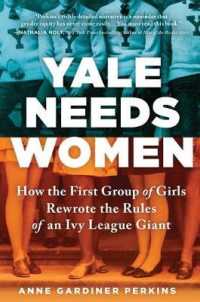- ホーム
- > 洋書
- > 英文書
- > Architecture
Full Description
This volume focuses on a series of mosques constructed after north-west India came under the political control of the Ghurid sultanate of Afghanistan in the 1190s. The most famous of the group is the Qutb Mosque in Delhi. The book explores the complex relationship between pre-modern architecture, history, and modern historiography. It brings together divergent voices that have enriched nineteenth- and twentieth-century scholarship on some of the earliest surviving mosques in South Asia.
Piety and Politics analyses the different traditions that contributed to the development of the earliest mosques in South Asia. It examines the evidence that architecture offers for cultural exchange, identity formation, and political polemics in the Ghurid and early Delhi sultanates in order to understand the context of contemporary debates, memories, and perceptions related to the mosques that form the subject of the volume. Presenting a range of perspectives on the meaning of pre-modern monuments, it contributes to broader debates on the nature of modern historical writing.
The collection includes writings on the beginnings of mosque architecture in South Asia(Alka Patel); the socio-political milieu of these structures (Andre Wink and Richard M. Eaton); controversies concerning the origins of the Qutb Mosque and Qutb Minar (Alexander Cunningham and J.D. Beglar); continuities and innovations in early Rajasthani mosques (Michael Meister and Robert Hillenbrand); and recent approaches to interpreting the Qutb complex in Delhi by Mohammad Mujeeb, Fritz Lehmann, Sunil Kumar, Anthony Welch, Hussein Keshani, and Alexandra Bain.
Highlighting both continuities and ruptures in the architectural traditions of the period, Finbarr Barry Flood's introduction constructs a socio-political context for the various academic positions represented in the volume. Flood underlines the need for multiple narratives and variant readings of the monuments.
Part of the prestigious Debates in Indian History and Society series, this reader will interest scholars, teachers, and students of medieval Indian history particularly those concerned with Islam, medieval Indian history, and Indian and Islamic architecture.
Contents
Introduction F.B. Flood; Part I Mercantile Communities and Early Indian Mosques -Chapter 1 'The Mosque in South Asia: Beginnings' Alka Patel; Part II Temple, Mosque, and Conquest-Chapter2 'The Idols of Hind' André Wink; Chapter 3. 'Temple Desecration and Indo-Muslim States' Richard M. Eaton; Part III The Qutb Mosque, the first Friday Mosque of Delhi-Chapter 4 Controversy Between J.D. Beglar and Alexander Cunningham regarding the origins of Qutb Mosque and Qutb Minar; Chapter 5 'The Qutb as a Social Document' Mohammad Mujeeb; Chapter 6 'Architecture of the Early Sultanate Period and the Nature of the Muslim State in India' Fritz Lehmann; Chapter 7 'Qutb and Modern Memory' Sunil Kumar; 'Epigraphs, Scripture, and Architecture in the Early Sultanate of Delhi' Anthony Welch, Hussein Keshani, & Alexandra Bain; Part IV Early Mosques in Rajasthan-'The "Two-and-a-Half-Day" Mosque' Michael Meister; 'Political Symbolism in early Indo-Islamic Mosque Architecture in the case of Ajmir' Robert Hillenbrand; 'Indian Islam's Lotus Throne: Kaman and Khatu Kalan'








